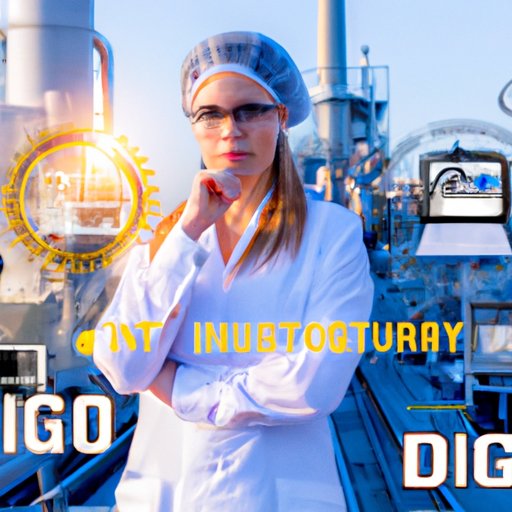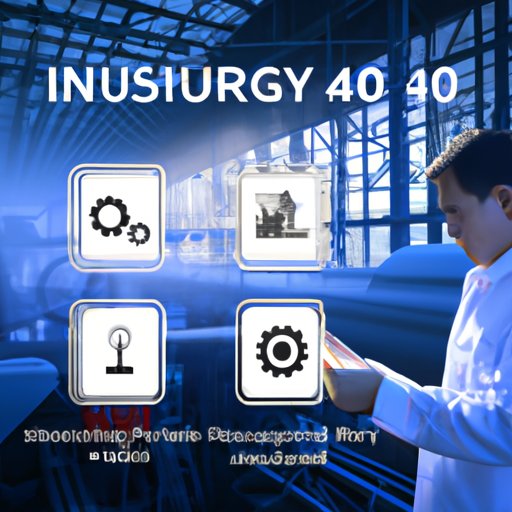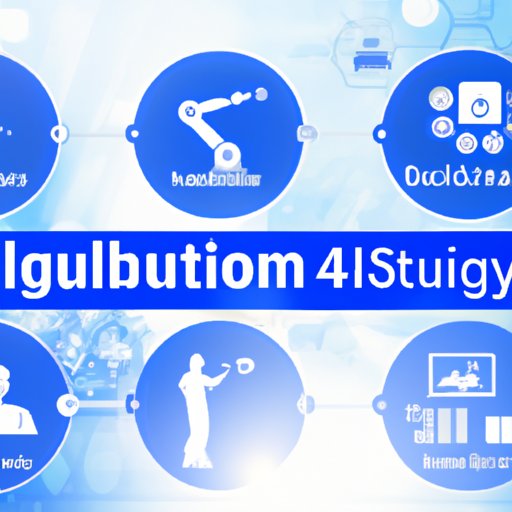Introduction
Industry 4.0 technology is a term used to describe the fourth industrial revolution. It refers to the use of digital technologies such as robotics, artificial intelligence (AI), and the Internet of Things (IoT) to streamline production processes and increase efficiency in manufacturing. This technology has the potential to revolutionize the way we do business, but it also brings with it a number of challenges. In this article, we will explore the benefits and challenges of Industry 4.0 technology and its impact on businesses, look at some successful models of implementation, and compare different types of Industry 4.0 technologies.
An Overview of Industry 4.0 Technology
Industry 4.0 technology is an umbrella term that encompasses a range of digital technologies that are transforming the way businesses operate. These technologies include robotics, AI, the Internet of Things (IoT), Big Data, cloud computing, and 3D printing. All of these technologies have the potential to dramatically improve the efficiency and accuracy of production processes, leading to increased productivity and cost savings.

Exploring the Benefits of Industry 4.0 Technology
Industry 4.0 technology has the potential to revolutionize the way businesses operate. Here are some of the key benefits of implementing this technology:
Improved Efficiency
The use of robots, AI, and other automated systems can drastically reduce lead times and labor costs. By automating mundane tasks, businesses can free up time and resources to focus on more important tasks. According to a study by McKinsey & Company, “automation could enable companies to reduce their labor costs by up to 30 percent, while increasing productivity and output by up to 20 percent.”
Enhanced Data Collection
By connecting machines and devices to the cloud, businesses can collect vast amounts of data about their operations. This data can be used to analyze and optimize production processes, identify problems, and develop new products and services. For example, a manufacturer can use data collected from sensors to identify weak points in their production line and make adjustments accordingly.
Automation of Complex Processes
Robots and AI can be used to automate complex processes that would otherwise require human involvement. This can drastically reduce errors and lead times, resulting in improved efficiency and cost savings. For example, robotic arms can be used to assemble complex components with precision and speed that humans cannot match.
Increased Connectivity
By connecting machines, devices, and people to the internet, businesses can create “smart factories” that are able to communicate with each other. This increases visibility into operations and allows for better coordination and collaboration between departments. According to a study conducted by Deloitte, “smart factories are capable of reducing lead times by up to 70 percent and reducing inventory levels by up to 90 percent.”

Understanding the Challenges of Implementing Industry 4.0 Technology
Although the potential benefits of Industry 4.0 technology are clear, there are some challenges associated with its implementation. Here are some of the key challenges:
Cost
Implementing Industry 4.0 technology can be expensive. Businesses need to invest in hardware and software, as well as training staff to use the new technology. Additionally, businesses may need to upgrade existing infrastructure or build new facilities to accommodate the technology.
Security
Connecting machines and devices to the internet creates potential security risks. Hackers could gain access to sensitive data or disrupt operations. To protect against this, businesses need to invest in robust cybersecurity measures.
Technical Limitations
Industry 4.0 technology is still in its infancy and there are still many technical challenges that need to be addressed. For example, AI algorithms still lack the ability to understand natural language or recognize objects in images. Additionally, robots still lack the dexterity and flexibility of humans, making them unsuitable for certain tasks.
Examining the Impact of Industry 4.0 Technology on Businesses
The introduction of Industry 4.0 technology has the potential to transform the way businesses operate. Here are some of the key impacts it could have:
Improved Decision Making
By collecting and analyzing large amounts of data, businesses can make informed decisions quickly and accurately. This can result in faster decision-making, improved customer service, and better resource utilization.
Faster Innovation
The use of AI and robotics can drastically reduce lead times, allowing businesses to innovate faster. This can give businesses a competitive edge and help them to stay ahead of the curve.
Greater Customer Satisfaction
Industry 4.0 technology can be used to personalize products and services, resulting in greater customer satisfaction. For example, AI algorithms can be used to recommend products or services based on a customer’s past purchases or browsing history.
Analyzing the Future of Industry 4.0 Technology
Industry 4.0 technology is still in its early stages, but it is rapidly gaining traction. Here are some predictions for its future adoption rates:
Predictions for Adoption Rates
According to a study by the World Economic Forum, “by 2025, roughly 75 percent of all production lines will have implemented some form of Industry 4.0 technology.” Additionally, “the global market for Industry 4.0 technology is expected to reach $2.7 trillion by 2022.”
Potential Disruptive Technologies
As Industry 4.0 technology matures, new disruptive technologies are likely to emerge. Blockchain technology and 5G networks could revolutionize the way businesses operate, allowing for faster speeds, greater security, and improved scalability.
Successful Models of Implementation
There are already some successful models of Industry 4.0 technology implementation. For example, Siemens has invested heavily in Industry 4.0 technology and has seen a significant improvement in their production process. They have also created a platform to share best practices with other companies looking to implement this technology.

Comparing Different Types of Industry 4.0 Technologies
Industry 4.0 technology encompasses a wide range of digital technologies. Here are some of the most common types:
Industrial Internet of Things (IIoT)
The IIoT is a network of connected machines and devices that can collect and share data. This data can be used to monitor and optimize production processes, leading to increased efficiency and cost savings.
Advanced Robotics
Robots can be used to automate complex processes that would otherwise require human input. This can drastically reduce errors and lead times, resulting in improved efficiency and cost savings.
Artificial Intelligence
AI algorithms can be used to analyze large amounts of data and make decisions quickly and accurately. This can result in improved decision-making, faster innovation, and greater customer satisfaction.
Conclusion
Industry 4.0 technology has the potential to revolutionize the way businesses operate. It can drastically reduce lead times, improve efficiency, and enhance data collection. However, it also comes with a number of challenges such as cost, security, and technical limitations. As the technology matures, it is likely to become more widely adopted. Successful models of implementation, such as Siemens, could serve as a valuable source of inspiration for other businesses looking to implement this technology.
(Note: Is this article not meeting your expectations? Do you have knowledge or insights to share? Unlock new opportunities and expand your reach by joining our authors team. Click Registration to join us and share your expertise with our readers.)
